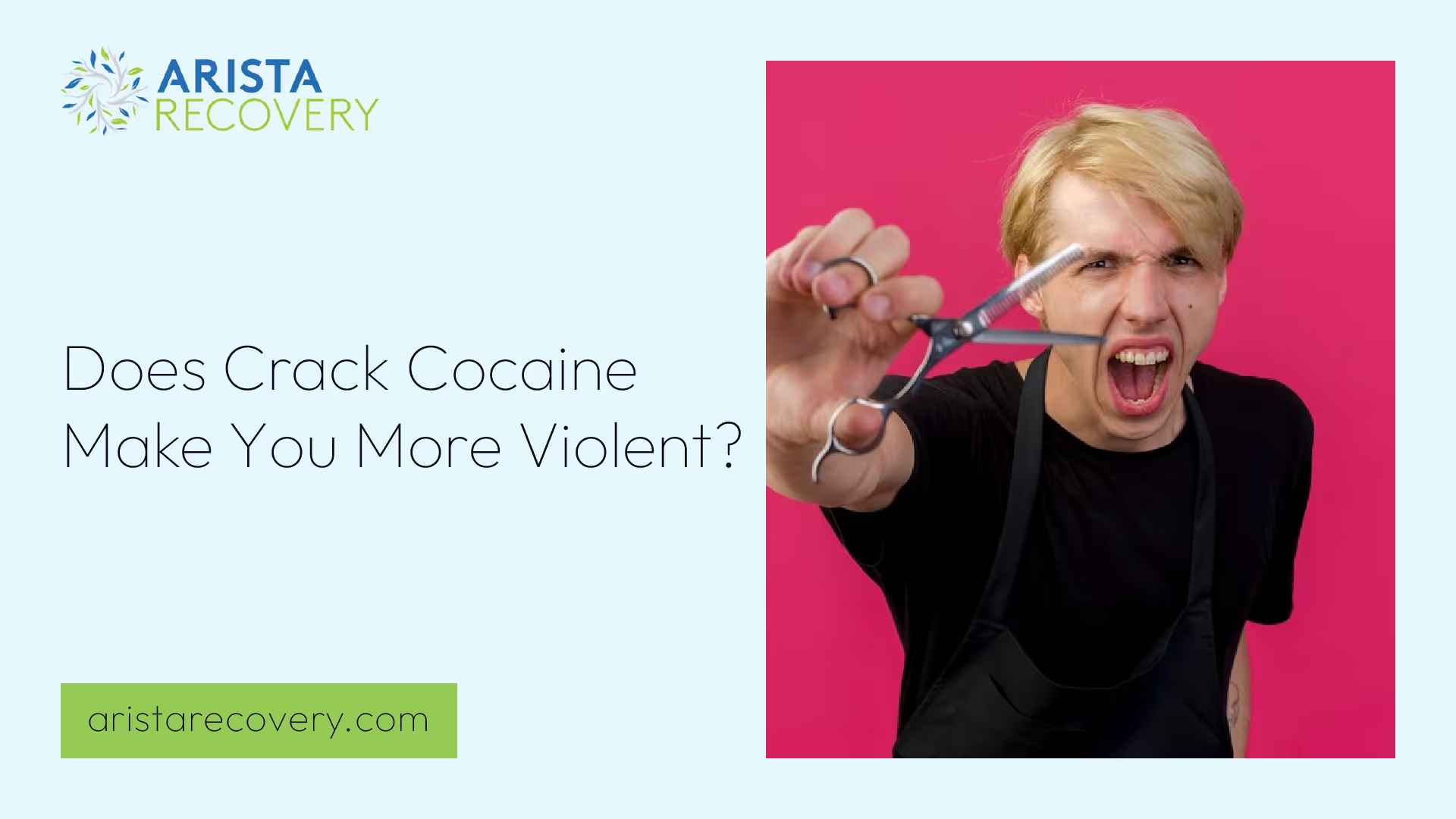
Does Crack Cocaine Make You More Violent?
Understanding Cocaine-Related Violence
Figuring out how drug use ties into violence is a tough nut to crack. One drug that keeps popping up in these talks is crack cocaine. Let's break down how crack cocaine and violent behavior are linked.

Violent Behaviors: The Basics
Violence can be anything from a nasty argument to something as serious as murder. In the medical field, there's a growing link between these behaviors and cocaine use. The level of violence can depend on many things, like a person's personality, their social circle, and how often they use drugs.
Crack Cocaine and Violence
Crack cocaine is often linked to high levels of violence. We're talking about everything from shouting matches to physical fights, threats, and even drug trafficking. A whopping 97% of drug users in one study admitted to being involved in violent acts.
Crack can mess with your mind, causing agitation, paranoia, hallucinations, and even violent or suicidal thoughts. These symptoms can be a direct result of the drug or can worsen existing mental health issues.
Smoking crack tends to make people angrier and more violent than snorting it. Daily users are also more likely to get involved in illegal activities.
Family members of crack users often report more domestic violence, theft, and legal troubles. This paints a pretty clear picture: crack cocaine and violence go hand in hand. But remember, just because two things are linked doesn't mean one causes the other. More research is needed to fully understand this relationship.
Research Studies on Cocaine and Violence
Looking into how cocaine use and violent behavior are connected helps us understand the broader impact of drug use. Several studies have shed light on this, focusing on both crack and powdered cocaine.
NESARC Study Findings
One key study is the 2001–2002 National Epidemiologic Survey on Alcohol and Related Conditions (NESARC). It compared violent behavior between users of crack and powdered cocaine. Participants were split into two groups: those who had used crack and those who had only used powdered cocaine.
The study found that crack isn't necessarily more responsible for violent behavior than powdered cocaine. Other factors play a big role. However, the study didn't provide much insight into how cocaine use and violent behavior are related over time.
Crack vs. Powdered Cocaine
Despite the NESARC findings, other studies show that crack cocaine use is linked to higher levels of violence. This includes everything from verbal arguments to serious crimes like murder.
Here's a breakdown of violent behaviors among crack users:
These numbers show a strong link between crack use and violent behavior. But the relationship is complicated, with many external factors at play. More research is needed to fully understand how cocaine use affects societal violence.
Behavioral Impact of Crack Cocaine Use
Crack cocaine can change how people act, often making them more violent. Let's look at how crack affects verbal and physical aggression, and its link to crime.
Verbal and Physical Aggression
Crack cocaine use is often linked to violent behavior, from minor arguments to serious crimes. Smoking crack tends to make people angrier and more violent than snorting it. In one study, 97% of crack users reported being involved in violent acts.
Criminal Activities and Violence
The aggressive behavior linked to crack often spills over into criminal activities. Many crack users have been to jail, often for drug-related crimes. Daily users are more likely to engage in illegal activities like threats, theft, and drug trafficking. Interestingly, the study also noted a decrease in sexual activities among crack users.
These findings highlight the significant impact of crack cocaine on behavior, especially in terms of aggression and crime. The question of whether crack makes you more violent seems to be answered by these studies, showing the need for effective interventions.
Health Implications of Crack Cocaine
Crack cocaine's health effects go beyond immediate physical harm. It's also linked to increased violence and a higher risk of HIV.
HIV Risk
Crack cocaine use is linked to a higher risk of HIV. This is due to risky behaviors and the drug's effects. Crack can impair judgment, leading to risky sexual behaviors. Sharing crack pipes can also cause sores and burns, which can spread HIV.
Mental Health and Violence
Crack can cause psychiatric symptoms like agitation, paranoia, and hallucinations. These symptoms can be a direct result of the drug or can worsen existing mental health issues. Crack is often linked to more intense symptoms than other forms of cocaine. For example, paranoia affects 68% to 84% of cocaine users, and violent behavior is reported in up to 55% of those with cocaine-induced psychiatric symptoms.
Crack cocaine is also linked to homicide, with its use detected in up to 31% of homicide victims. Smoking crack tends to make people angrier and more violent than snorting it.
The health implications of crack cocaine are severe. The drug's impact on mental health, its tendency to induce violent behavior, and its link to HIV risk are just a few reasons why crack is so dangerous. Understanding these risks is crucial for developing effective interventions.
Cocaine Use and Criminal Behavior
To answer whether crack cocaine makes you more violent, we need to look at its link to criminal behavior. Various studies show a strong connection between crack use and domestic violence, as well as other legal issues.
Domestic Violence
Family members of crack users often report more domestic violence. This includes theft and giving money to the user to buy drugs. Relatives of snorted cocaine users also report physical and interpersonal violence, including assaults and threats.
There's a clear link between crack use and domestic violence, including both physical and non-physical violence, theft, and legal problems. Family members frequently experience theft, physical assaults, threats, and fights.
Occupational and Legal Issues
Crack users also face higher rates of job, family, and legal problems. They engage in more illegal and violent activities like burglary and assault compared to non-users.
This data shows that crack use is not only harmful to the user's health but also disrupts their social and work life, increasing their likelihood of criminal behavior. This underscores the need for understanding the violent effects of crack and developing effective interventions.
Cognitive Effects of Crack Cocaine
Crack cocaine has a big impact on cognitive functions and brain structure. Let's explore how it affects memory, cognitive function, and brain structure.
Memory and Cognitive Function
Crack cocaine can impair spatial memory, confrontation naming, perceptual-motor speed, and cognitive flexibility. However, verbal memory doesn't seem to be significantly affected.
These cognitive impairments can contribute to the increased risk of violent behavior often seen in crack users.
Impact on Brain Structure
Crack cocaine also affects brain structure. Users experience double the rate of gray matter loss compared to non-users. This can lead to cognitive impairments, memory problems, and difficulties with decision-making and impulse control, making it harder to control violent behavior.
The cognitive effects of crack cocaine help explain the link between its use and violence. It's clear that crack has a profound impact on the brain and cognitive function, contributing to increased aggression and violent behavior.
References
[1]: https://pubmed.ncbi.nlm.nih.gov/1683859/
[2]: https://www.ncbi.nlm.nih.gov/pmc/articles/PMC2745146/
[3]: https://www.ncbi.nlm.nih.gov/pmc/articles/PMC181074/
[4]: https://www.ncbi.nlm.nih.gov/pmc/articles/PMC9141127/
[5]: https://www.bu.edu/aodhealth/2010/09/01/is-crack-cocaine-linked-to-more-violent-behavior-than-powdered-cocaine/
[6]: https://www.northstarbehavioralhealthmn.com/resources/does-crack-cocaine-make-you-more-violent
When mental health challenges and addiction intersect, it can feel isolating. At Arista, we offer compassionate, evidence-based, and trauma-informed care to help you heal, grow, and move forward.
You’re not alone in this.
When mental health challenges and addiction intersect, it can feel isolating. At Arista, we offer compassionate, evidence-based, and trauma-informed care to help you heal, grow, and move forward.
Support that moves with you.
You’ve taken a brave first step. At Arista Recovery, we’re here to help you continue with best-in-class care designed for long-term healing and support.
.webp)






